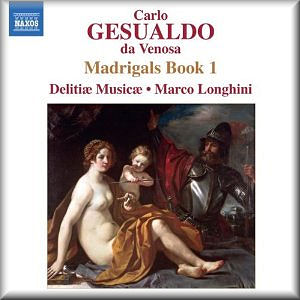 |
 |
| 

alternatively
CD: MDT
AmazonUK
AmazonUS
Sound
Samples & Downloads
|
Carlo GESUALDO
da Venosa (1566-1613)
Madrigals - Book 1
 Delitiae Musicae (Alessandro Carmignani, Paolo Costa (alto), Fabio
Fùrnari, Paolo Fanciulacci (tenor), Marco Scavazza (baritone), Walter
Testolin (bass), Carmen Leoni (harpsichord)*)/Marco Longhini
Delitiae Musicae (Alessandro Carmignani, Paolo Costa (alto), Fabio
Fùrnari, Paolo Fanciulacci (tenor), Marco Scavazza (baritone), Walter
Testolin (bass), Carmen Leoni (harpsichord)*)/Marco Longhini
rec. 23-27 July 2007, Chiesa di San Pietro in Vincoli, Azzago, Verona,
Italy. DDD
 NAXOS 8.570548 [56:15]
NAXOS 8.570548 [56:15] 
|
|
|
Baci soavi e cari (1. Parte) [3:36]
Quanto ha di dolce amore (2. Parte) [3:15]
Madonna, io ben vorrei [3:35]
Come esser può ch'io viva? [2:41]
Gelo ha madonna il seno [2:39]
Mentre madonna (1. Parte) [2:39]
Ahi, troppo saggia (2. Parte) [2:56]
Se da si nobil mano [2:24]
Amor, pace non chero* [2:03]
Si gioioso mi fanno il dolor miei [3:32]
O dolce mio martire [2:39]
Tirsi morir volea (1. Parte) [3:21]
Frenò Tirsi il desio (2. Parte) [2:46]
Mentre, mia stella, miri [2:56]
Non mirar, non mirare [3:08]
Questi leggiadri odorosetti fiori [3:37]
Felice primavera! (1. Parte)* [2:11]
Danzan le ninfe (2. Parte)* [1:33]
Son sì belle le rose [2:31]
Bella angioletta [2:13]
Few composers have so fascinated the music world as Carlo Gesualdo
da Venosa. Part of the interest has been generated by his remarkable
life, especially the fact that he once murdered his wife and
her lover. Musically speaking the madrigals he composed in the
latter stages of his life have drawn the interest of performers
and audiences as well as composers of a much later era. Among
the latter is Igor Stravinsky who composed a Monumentum pro
Gesualdo di Venosa, based on three of his madrigals. The
late madrigals are collected in the fifth and sixth book, and
move far away from the musical mainstream of his time. Until
the end of his life Gesualdo stayed away from the seconda
prattica and the use of a basso continuo. In his application
of dissonances and chromaticism he goes further than any composer
of his time.
In comparison his early madrigals are much more moderate and
conventional. That is probably the main reason they haven't
received as much attention as the later works. The first two
madrigal books were published in the same year: 1594. They were
presented as a compilation Gesualdo had published previously.
Unfortunately none of these have been preserved. So it is impossible
to assess how exactly Gesualdo has developed. The first two
books certainly don't present him as a student. These are mature
works in which the texts are effectively expressed with the
musical means of the time. Although there are some dissonances
in a number of madrigals, Gesualdo doesn't go to extremes in
regard to harmony as in his later madrigals.
In the first book he uses texts by famous poets, like Giovanni
Battista Guarini and Torquato Tasso. Several of these were also
set to music by other composers of his time, for instance Claudio
Monteverdi and Luca Marenzio. Gesualdo seems to have had a special
liking for gloomy subjects. That is not only reflected in his
madrigals, but also in his motets. It is notable, though, that
the first book ends with five madrigals of a more joyful character.
The titles are telling: Bella angioletta (Beautiful little
angel), Felice primavera! (Happy Spring!) and Danzan
le ninfe oneste (The honest nymphs and shepherds dance).
Compare these with titles of madrigals like Come esser può
ch'io viva (How can it be that I live), O dolce mio martire
(O sweet torment of mine) or Gelo ha madonna il seno
(My lady has ice in her breast).
After having completed the recording of the madrigals of Claudio
Monteverdi the ensemble Delitiae Musicae have started a project
to record all six books of madrigals by Gesualdo. Marco Longhini's
interpretation is quite unusual in several respects. To begin
with, he consistently uses only male voices in his madrigal
recordings. This means that the male alto Alessandro Carmignani
who takes the upper part has to sing at the top of his range
most of the time. He manages to do so quite well, but now and
then his voice does sound a little stressed.
Historically this practice may be defensible, two other features
of this interpretation are questionable. Firstly, the frequent
tempo fluctuations which are often extreme and sound unnatural
to my ears. At the last line of the first madrigal, Baci
soavi e cari, the music almost comes to a standstill. Secondly,
the use of crescendi and diminuendi. This is an interpretational
device which rather belongs to the seconda prattica which
was introduced in the early 17th century. But in these madrigals
it seems hardly appropriate.
In three of the madrigals the harpsichord plays colla voce.
I don't understand the reasoning behind this practice nor do
I understand why it is used in these particular madrigals. Musically
it is unsatisfying and damages the performance. In several madrigals
the last line has to be repeated, and the ensemble takes mostly
too long a pause before doing so. This becomes a bit annoying
after a while. It is probably meant to increase the drama, but
it doesn't.
It is these mannerisms that raise my scepticism about this new
recording. The singers of Delitiae Musicae are excellent, and
I certainly have enjoyed much of what they do. But there are
just too many questionable aspects, and because of that I can
only approach this disc with considerable caution.
Johan van Veen
see also
Don
Carlo Gesualdo, Prince of Venosa, Count of Conza (1561†
- 1613) by Len Mullenger
|
|












